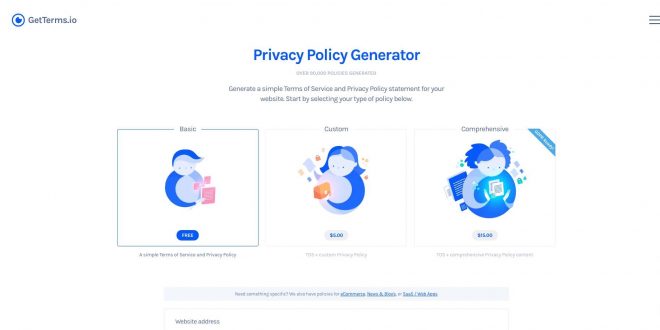GetTerms is a fantastic privacy policy generator tool you can use completely free, and it also has some paid features. We often overlook seemingly minor details while building a website for our business, such as a privacy policy. The issue shouldn’t fall through the cracks, however.
In many countries, privacy policies are a legal requirement, an essential part of being compliant. Despite the confusion and complexity of privacy policies, many tools simplify the process. As part of this article, we’ll examine GetTerms. One of the best tools for building privacy policies, and explain the primary elements that define a privacy policy.
What is GetTerms?
GettingTerms.io is a free service that generates generic privacy policies for websites based on regular, reasonable, and ethical practices. We can create simple terms & conditions and privacy policies customized as needed for websites powered by WordPress, Shopify, and more.
What Is a Privacy Policy for Websites?
Privacy policies, also known as privacy notices, explain how your business collects, uses, shares, and manages private information relating to your website users and customers. All the data collected by your website, including that of your users, should be described in your privacy policy:
- Identify
- Contact information
- Adresse
- Date of birth
- Information about credit cards
- The Internet Protocol address
- Web-browsing data
- Cookies
You should also explain how and if this data were used – whether it’s sharing it with apps or for marketing and advertising purposes, like retargeting ads or email marketing.
GDPR, CalOPPA, and COPPA
With privacy policy generator tools, you’ll often encounter GDPR, CalOPPA, and COPPA laws. GDPR: Anyone collecting data from your website that lives within the European Union must comply with the General Data Protection Regulation. Following the European Union, if your website does not comply with GDPR guidelines – or breaches your users’ privacy, as the law makes it clear – you could be fined up to 4% of your revenue or a staggering €20 million.
CaOPPA: California residents are entitled to privacy protection under the California Online Privacy Protection Act whenever they provide personal information via the internet. Unlike most countries, the United States makes privacy decisions at the state level rather than enacting national legislation. Children under the age of 13 should not be allowed access to websites under the Children’s Online Privacy Protection Act, restricting their use of websites.
Do not take any risks because it’s easy to meet these requirements! There are three options offered by GetTerms.io: a free basic policy, a customs policy for $5, and GDPR compliant policy for $15. A basic policy requires just a few details. You can use it as a temporary solution while you create a more comprehensive policy in the future. Despite not meeting international standards, this policy gives you another option. Creating privacy policies is easy with this generator. Default selections for customization options are available with the $5 and $15 options.
These include:
- Your site asks for what kinds of personal information
- Your collection of data and how you use it
- Providing third parties with information
- Cookies used by this website are as follows
What services does GetTerms provide?
You can also generate plain-English privacy policies using GetTerms’ Basic and Comprehensive packages. Users concerned about their personal information may use GetTerms’ free version – it is recommended for websites and businesses that collect little to no data from their customers, for example, personal websites and websites that lack a simple contact form.
In addition to logging, cookies, and third-party disclosures, GetTerms’ standard privacy policy specifies users’ rights and responsibilities regarding their personal information. Collecting and storing visitor information may occasionally be necessary, including inquiries from visitors, comments, or competition entries; GetTerms recommends this policy. Furthermore, GetTerms’ Comprehensive Privacy Policy provides extra security, fraud prevention, and user-generated content customization in addition to user-generated content, promotional content, business transfers, etc.
The scope of our cookie policy is defined by details designed to conform to GDPR, CPPA, also Australian privacy laws. If your company needs a more comprehensive guide to developing a website, GetTerms recommends this policy. In GetTerms, we assume that you are concerned about your users’ interests. In all the privacy policies Get_terms generates, users are informed about typical, reasonable, and fair use of information. The GetTerms website provides a usable document you can customize as needed to fit your specific needs.
To ensure that the privacy policies of your clients are covered, GetTerms recommends seeking independent legal advice. With GetTerms’ simple form, you can make a Terms & Conditions statement and Privacy Policy statement that can be tailored to your needs.
Is a privacy policy necessary?
With an increasingly public digital world, it is more important than ever to understand and respect privacy. In some states, you may be legally required to include a privacy policy that describes how you collect, store, and share (and safeguard) personal information. As another example, you might be required to provide a privacy policy before you’re allowed to work with some content services.
For example, you can request full access to your app on Instagram, and Instagram will ask you for the link to your privacy policy. Similarly, the Google Play marketplace requires apps that handle user data, such as personal information, to have a privacy policy. Suppose your organization collects personal details, contact details, account information, or browsing habits through website cookies. In that case, it’s generally a good idea to make a privacy policy and publish it along with your services.
Almost all websites have similar policies for protecting privacy. GetTerms provides an introductory privacy policy statement covering these situations. These terms are recommended for websites and businesses that do not collect such information (if any), do not use cookies (or do not need to disclose their cookie policies), and don’t give any information to third parties. The GetTerms flexible privacy policy template allows for more customized content, including cookie policies also the General Data Protection Regulation (GDPR).
GetTerms.io Affiliate Program for websites powered by WordPress, Shopify, and more
Now GetTerms.io offers affiliate programs, with 20% commissions paid on every referral you make. Anyone setting up privacy policies is eligible for this program, including agencies, freelancers, bloggers, consultants, also firms that provide services to others. Signing up is, of course, open to everyone.
What are the steps involved?
When you join the GetTerms.io Affiliate Program, we’ll provide you with a referral link you can share with your customers, colleagues, or audience. You’ll receive 20% of the total purchase price when customers complete transactions using your unique link. By choosing the payment methods you’ve nominated, you’ll receive your earnings every month.
What are the requirements to join?
Affiliates and businesses around the world can participate in the GetTerms.io Affiliate Program. For the primary point person, your company must provide their name and email address.
How can I become an affiliate of GetTerms.io?
That’s all there is to it. We have a signup form on our website that you can use to sign up. Register now for GetTerms.io’s Affiliate Program With a GDPR-compliant affiliate management platform like TapFiligate, the GetTerms.io affiliate program is powered by TapFiligate.
When should privacy policies be updated?
Privacy policies aren’t set in stone. No matter how mundane they seem at first glance, privacy policies are living documents that must evolve as your business, website, and privacy laws change. In the event of a data breach or a customer discovering an outdated policy, an obsolete policy can be a severe headache for any business regarding how their data might be collected or used since your policy was written. bIn recent years, the introduction of GDPR and CCPA has proven that regulations can change over time, rendering your privacy practices irrelevant, uncompliant, and out of date.
In addition, if your team is extensive, with different departments, it may be difficult for every worker to keep up with the minor updates in data management practices and updates to your website or app. You must review your policy regularly and schedule with all employees relevant to your business to prevent missing anything that could expose your business. Modify your policy also tell your consumers any potential privacy consequences, no matter how modest the changes are.
You will usually be required to prepare and publish an updated document, as well as notify your customers. Generally, it’s a legal requirement to explain how your customers’ personal information is used and make sure they consent to the changes in your policy following data protection laws. Several customers will probably reject your new policies and decide to opt-out. Today’s consumers are concerned about their privacy online, which can affect whether they trust a company. Keeping your business clear and maintaining good relations with your customers requires that you set aside time to regularly review and evaluate the policy and keep a proactive stance on legal compliance.
Final Words
GetTerms will help you to generate a high-quality privacy policy for your website and business. Hope you like our article on GetTerms, and if you have any questions or queries regarding GetTerms, mention those in the comment section.
The use of the privacy policy generator is free of charge. To design, publish, and display your privacy policy, you’re not even required to input any credit card details. Choosing a paid plan will allow you to add more policies or compliance features.
ress while at the same time protecting your privacy. It only takes a few minutes to make a COPPA, GDPR, or CalOPPA compliance policy that’s fully compliant with these regulations.
All legal agreements can be generated with one tool using TermsFeed. GetTerms helps you create privacy policy pages on your website. Websites with a global audience can benefit from PrivacyPolicies.com’s international coverage. The Shopify Privacy Policy Tool is GDPR compliant and the standard for eCommerce privacy policies.
However, if you do not gather information, you must have a privacy policy since it states that your application or website does not collect personal details. By establishing privacy policies, you notify your users what data you collect, why you do not collect data, how it is used, and what rights they have over their information.
You should make your privacy statement easy to understand, direct, and straightforward. Avoid using legal jargon or technical terms. Users must be informed if you change how personal information is used. In the end, the strength of a privacy policy is dependent on the effectiveness of the team that implements it.
 Next Tech Magazine Get The Latest Technology Updates
Next Tech Magazine Get The Latest Technology Updates







